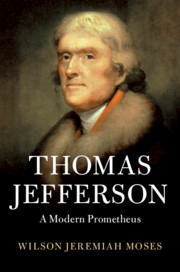Book contents
- Thomas Jefferson
- Cambridge Studies on the American South
- Frontispiece
- Thomas Jefferson
- Copyright page
- Dedication
- Contents
- Preface
- Acknowledgments
- Note on Methods and Bibliography
- 1 Introduction
- 2 Lincoln and Historiography
- 3 Let Our Workshops Remain at Monticello
- 4 Life, Liberty, Property, and Peace
- 5 What is Genius? “Openness, Brilliance, and Leadership”
- 6 A Renaissance Man in the Age of the Enlightenment
- 7 Baconism and Natural Science
- 8 Anthropology and Ethnic Cleansing: White “Rubbish,” Blacks, and Indians
- 9 Education, Religion, and Social Control
- 10 Women and the Count of Monticello
- 11 Debt, Deference, and Consumption
- 12 Defining the Presidency
- Index
3 - Let Our Workshops Remain at Monticello
Published online by Cambridge University Press: 01 April 2019
- Thomas Jefferson
- Cambridge Studies on the American South
- Frontispiece
- Thomas Jefferson
- Copyright page
- Dedication
- Contents
- Preface
- Acknowledgments
- Note on Methods and Bibliography
- 1 Introduction
- 2 Lincoln and Historiography
- 3 Let Our Workshops Remain at Monticello
- 4 Life, Liberty, Property, and Peace
- 5 What is Genius? “Openness, Brilliance, and Leadership”
- 6 A Renaissance Man in the Age of the Enlightenment
- 7 Baconism and Natural Science
- 8 Anthropology and Ethnic Cleansing: White “Rubbish,” Blacks, and Indians
- 9 Education, Religion, and Social Control
- 10 Women and the Count of Monticello
- 11 Debt, Deference, and Consumption
- 12 Defining the Presidency
- Index
Summary
“Let our workshops remain in Europe,” Jefferson famously wrote, with deceptive rhetorical flourish. These words are the most frequently cited example of what is called Jeffersonian “agrarianism,” in Notes on Virginia, and one of the most familiar to historians, but “agrarian” is not a term that Jefferson employed frequently or with fondness. More than once he used the term negatively, as we shall presently see, and he knew the term was ambiguous, having radical associations both in ancient Roman law and in the rhetoric of his times. For example, Thomas Paine recycled the word in Agrarian Justice (1797), which was a proposal for a sweeping big-government reform that Jefferson could hardly have approved. Jefferson’s brand of the ideology was much more in step with the agrarianism of John Taylor, who is generally regarded its foremost American prophet, but even Taylor did not use the term frequently.
- Type
- Chapter
- Information
- Thomas JeffersonA Modern Prometheus, pp. 48 - 101Publisher: Cambridge University PressPrint publication year: 2019

